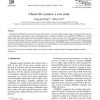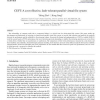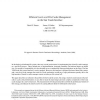105
click to vote
FGCS
2002
15 years 2 months ago
2002
Traditional distributed file systems do not provide clusters with strict single-system image, and cannot fully meet the cluster applications requirements, such as I/O performance,...
145
Voted
CLUSTER
2004
IEEE
15 years 2 months ago
2004
IEEE
This paper describes a novel technique for establishing a virtual file system that allows data to be transferred user-transparently and on-demand across computing and storage serve...
TOCS
2008
15 years 2 months ago
2008
We introduce external synchrony, a new model for local file I/O that provides the reliability and simplicity of synchronous I/O, yet also closely approximates the performance of a...
101
click to vote
SIGOPS
2008
15 years 2 months ago
2008
The layered design of the Linux operating system hides the liveness of file system data from the underlying block layers. This lack of liveness information prevents the storage sy...
JPDC
2006
15 years 2 months ago
2006
The vulnerability of computer nodes due to component failures is a critical issue for cluster-based file systems. This paper studies the development and deployment of mirroring in...
116
click to vote
JPDC
2006
15 years 2 months ago
2006
Previous studies indicate that I/O could become a performance bottleneck in commodity PC-based cluster Web servers. Current local native file systems do not work well for expensiv...
120
click to vote
USENIX
1990
15 years 3 months ago
1990
In developing a distributed file system, there are several good reasons for implementing the client file cache manager as a user-level process. These include ease of implementatio...
142
click to vote
USENIX
1994
15 years 3 months ago
1994
Despite impressive advances in file system throughput resulting from technologies such as high-bandwidth networks and disk arrays, file system latency has not improved and in many...
139
click to vote
PDPTA
2000
15 years 3 months ago
2000
Performance Oriented Distributed Operating System (PODOS) is a clustering environment, being built on a monolithic Linux kernel. PODOS augments very few components to the Linux ke...
107
click to vote
OSDI
2000
ACM
15 years 3 months ago
2000
ACM
Storage Latency Estimation Descriptors, or SLEDs, are an API that allow applications to understand and take advantage of the dynamic state of a storage system. By accessing data i...




